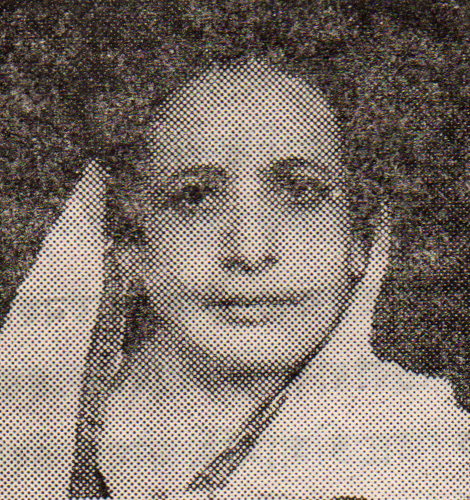 Anuradha
Das
Anuradha
DasSmti Anuradha Das, the composer of such songs
like �Phalgun tomak jonalo nimaatran�, �O Phalgunare Utala Ba, gusi ja�,
is a familiar name. Tall, healthy, well built with ruddy complexion,
Anuradha Das has a bright radiance of Knowledge on her face. She always
has a smile of earnest desire on her lips. Anuradha Das was the first born
daughter of Lalmohan Choudhury and Monorama Choudhury who were permanent
residents of Tezpur. Aunradha Das was born in the year 1928 in Laban of
Shillong, in her grandfather Atmaram Deka�s home. But of course Anuradha
had spent her childhood in Tezpur.
Anuradha very much wanted to study in college after
passing the matriculation examination in 1944. But not being able to go
against the opinion of her parents her to stop her education with much
sorrow. No college was started in Tezpur during that time. Her parents did
not want to keep her in Guwahati to study as the Second World War was
going on. They apprehended that girl�s hostels would be turned into army
campus. Anuradha Das like to sing and dance, she liked to write along with
her studies since childhood. She performed the role of Usha in Joytiprasad
Agarwala�s �Sonit Kunwari� while studying in class VII. She received a
medal as a present because of her beautiful acting. She has kept this
medal even now with care. During that age only, talented Anuradha�s talent
started showing prospects. Her parents and other family members tried to
nature her talent and that is why we have got Anuradha Das as an artist
and a writer amidst us.
Anuradha Das was married to Dr Bhabendranath Das of
Barpeta in an auspicious moment on an auspicious day in 1946. She entered
into the lovely garden of family life talking a long veil leaving there
the free life of girlhood. The beautiful days of her conjugal life passed
into years and in due course of time four children came to their lives and
it enlarged her family. The children�s laughter and cry filled her world.
But despite being too involved in her family life she wanted to get
involved in social works amidst her busy schedule. So she came out of the
four walls of her home and started her social being the Secretary of
Barpeta District Mahila Samity. Gradually she became the member of Women
Congress; Director of Moina Parijat, Selected Government Member of
municipality, Vice President of District Congress, became the member of
Barpeta District Sahitya Sabha and her taken initiative to serve the
society.
Establishing the Nursery School of Barpeta she had
taken the responsibility of teaching in the school for many years and she
also contributed to the development of the school which is recognized
today as a full- fledge school.
Anuradha Das�s husband suddenly expired on 30th
December 1966. And since then she had to take the entire responsibility of
her family. But under such circumstances also she was able to educate her
children overcoming various hurdles. After completing almost all her
responsibility towards her children, she specially concentrated on getting
involved in the world of literature.
Though Anuradha could step into the wide field of
literature during her school days by writing stories and poems, but she
got the opportunity to truly devotee herself to literature and culture
only after she entered into family life. Smti Das is chiefly a lyricist.
She could please many Assamese artist and lover of melody by composing
many songs. Her first anthology of lyrics, �Surashri� was published in
1956. After that another anthology of lyrics �Giti Malika� was published
in 1988.
The songs published in both the anthologies, �Surashri�
and �Giti Malika� love become lovely with the beautiful combination of
depth of thought, aesthetic sense and also for the metaphors.
Anuradha Das is basically a poet of love and nature.
The word composition, beautiful imageries, unique orderly arrangement of
words and technique of expression of her songs would overwhelm a group of
art loving audience. One of the songs published in �Surashri� goes like
this-
�Phalgun, I invite you
You will come and bring
Various colors of yours
With that you will paint my mind�
And one more song is-----
�Oh the restless wind of Phalgun
Go away, go away----�
The way the poet has expressed her emotions and
feelings in these two songs to please the mind by brining the immense
beauty of nature is wonderful. The melody of these songs fills the heart
and mind of each art-loving audience.
The songs for children, holi-song, lullabies, bihu
songs and modern songs and songs composed in Bengali language are also
included in Anuradha Das�s �Surashri and �Giti Malika�. These songs can be
categorized as love songs, devotional songs, on nature and lullabies
composed of soft words coming out of the mother�s heart.
�Gitimalika� which basically comprise of devotional
song and songs of nature also includes holi songs. A holi song goes like
this------
"In such sweet spring, the color spreads in the Horizon
The wives of milkman are merged in playing holi.
Radha plays with Krishna; her mind is connected to the
flute.
Mind is restless in each moment".
Through this song the poet has given the description
about how Krishna and Radha were happily playing holi on the bank of
Yamuna smearing color on each other amidst beautiful nature and how the
wives of milkmen were dancing and singing the devotional songs in the name
of Lord Krishna.
In the same way among the patriotic songs, the song
which was composed in 1962 during the Chinese aggression is---
"Let�s proceed to this war
Rangman, Rsngili, Kaliman Pakhili
Don�t neglect the war of the Frontier
Cannons, guns, nothing is needed
Binding all by the thread of unity
Talking the sword of courage in each hand
Overthrow the idleness of enemies".
Through this song she displays her sense of patriotism
and with that song she appealed to all to fight courageously. The poet
says that there is no need of cannons and guns if preceded by being
united.
Among the Bengali song of Anuradha Das, one is------
"Ogo chand, tumi sara gaya mekhe diyechile
Tomar premor goshana
Sei sukhe amar buk bhare ase
Gharay nahike bedana"�
Through this song the poet seems to try to express the
earnest desire to touch upon human love and affection.
Her poem titled, �Past� was published in the first
issue of �Aaidew�, a journal of Assamese women living in Kolkata, which
was first published in 1974. Her poem was published even in the second
issue of the second year of that journal which was edited by Juthi Bhuyan.
Apart from this her six songs were published in "Range Range Phaku Khele"
which was published from Barpeta in 1977. It is worth mentioning that his
anthology was edited by renowned writer and the former president of Assam
Satiya Sabha, Sri Prasanna Lal Choudhury. In �The voice of Assamese Women
Poets�, her poem �Last Gift� was published and a translated version of
Rabindranath Tagores�. �Devatar Gras� was published as a lyrical poem, Her
article �My Songs the Hidden Story� was published in �Barpat� a Souvenir
of Barpeta Sahitya Sabha, edited by Sri Munindra Nath Das. In the Bihu
magazine titled �Rongali� edited by Ranjit Patra her song, "Kapuphul in
the hair Knot was published. Her travel writing �Few Days outside Assam�
was published in the magazine, ��Sarathi� edited by Smti Padmakumari
Gohain. Her poems were published in the magazine �Sulekha� published by
Barpeta Lekhika Samaroh Samiti and edited by Smti Malaya Devi.
The manuscripts of many stories and translated works
are still with Das. The translated works are still with Smti Das. The
translated version of the Bengali novel �Chitar Bahniman� by Phalguni
Mukherjee is still unpublished�.
Apart from all these Smti Das written �Sri Sri Santoshi
Mata�s Stories� a book about the history of Goddess Santoshi and the
rituals of Puja. She also published a Bengali book titled �Baukhaki�.
In brief, the literary talent of Anuradha Das has been
widely published and extended through her lyrical Composition, writings in
magazine, newspapers, radio and film. We wish she would enrich our
language and literature by her new literary creations.
Anuradha Das has earned much fame being a film artist.
In 1969 she acted in the film �Aparajeya� for the first time. The director
of this film was renowned dramatist and learned dancer of Barpeta Sri
Munindranath Bayan, Sri Phani Talukdar and Gauri Barman.
Apart from this she also got the opportunity to act in
films like �Uttran�, �Hridayar Prayojan�, and �Manasi�. Brojen Baruah
invited her to act in the film; �Ito Sito Bahuto� and Nip Baruah invited
her for the domestic problems.
She likes to do all household works despite devoting
herself social, cultural and literary activities. Cooking, weaving,
kitchen- gardening and looking after the flowers plants in her garden are
among her daily chores.
She was very fond of fishing. Whenever she had the urge
to go for fishing, she drove along with her children to a small stream,
three km away from Barpeta town.
Smti Anuradha Das loved to visit places. She had the
chance to visit many places in India while her husband was alive. One
could enjoy and learn many things by traveling to difference native and
foreign places than one could learn about a place and a nation by reading
books and news papers. All should travel if one has time and opportunity.
Smti Das commented that it is our sacred duty to go to the people, to be
with them. So she has been traveling to different places of India with her
entire family if not yearly but in the interval of two years.
After many years of her husband�s death her only son,
who is a doctor went to England, and it�s been many years that he has been
working in a hospital in Carlyle near Scotland. Taking the opportunity
Smti Das gone to her son and daughter- in- law�s place and visited many
places in England. She has seen and learnt about their culture, manner,
and social system and also about the development of education system. She
revealed that though we have to learn many things from that country, yet
to learn from Indian Society and culture.
At present Smti Das stays in her home in Guwahati, yet
the household responsibility lies on a Nepali boy who was brought up like
her own son. She has kept the boy with her since his childhood and an
Assamese girl was married to him giving the recognition the son
daughter-in-law, she has left all the household responsibilities on them.
We hope that Anuradha Das who is now above sixty would
spend her days being secured and in peace and she would fill the gamut of
literature and culture with new resources and production. Many rhythmic
songs have enchanted many Assamese melody lovers through All India Radio,
Guwahati since 1956. Each of her melodious songs goes on narrating the
tender stories of her beautiful mind.
In 1988 she was felicitated with a certificate as a
renowned lyricist, actress and a social worker by All Assam Lekhika
Samaroh Samiti in the 20th Annual convention held in Barpeta.
Recollecting many big or small things of her life Smti
Anuradha Das told us- "today I feel sad when I think about how the
childhood days have gone with time without being aware�. Regretfully, she
utters what Rabindranath Tagore wrote,
�My days did not stay in the golden cage�.
